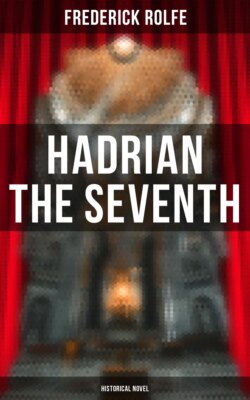Читать книгу Hadrian the Seventh (Historical Novel) - Frederick Rolfe - Страница 5
На сайте Литреса книга снята с продажи.
Chapter 1
ОглавлениеTable of Contents
What was causing the special correspondents in Rome to exude the subterfuges, with which (as a pis-aller) they are accustomed to gain their daily bread, was no such recondite matter after all.
Just as Jews are less commercial, and Jesuits less cunning, so journalists are less capable than they are supposed to be. As a matter of fact, they are quite unscientific persons, in that they go about their business in a fortuitous manner trusting to the human element called "smartness" for producing their effects. They have not yet realized the instability of all human elements. The superhuman is a sealed book to them. They mean oh so well: but they have no knowledge of first principles. They invariably commit the unpardonable error of confounding universals with particulars: because the influence of fragile or unworthy authority, customs, the imperfection of undisciplined senses, and concealment of ignorance by ostentation of seeming wisdom, are as stumbling-blocks which obstruct their path to Truth. Add to this a lack of sympathetic intuition and of an historical knowledge of their subject. They take no end of pains to acquire a fluid style of writing; and it may be admitted that, within their limitations, they can describe the superficies of almost anything which may be shoved under their noses. But, as for giving a scientific description (under such heads, for example, as the Material, Formal, Efficient, and Final Causes), so that one can derive a satisfactory understanding of the thing described,— that is beyond their power.
And, as for proceeding in a scientific manner, whether by means of the liberal or the so-called occult arts, to what on the whole is the essence of their business, viz. the collection of news, why Sir Notyet Apeer's young men, or Sir Uriah Tepeddle's criminal-investigators, or the "yearnest" exoletes who fill the Daily Anagraph with food for literary lionlets and Roman Catholic clergy and nonconforming philanthropists, have no such adequate ideal of their branch of literature. Their aim is to please editors or proprietors; and, so, to earn an as-near-as-may-be-legally honest living. No more.
Consequently, when (during March and April) a score or so of these good gentlemen found themselves in Rome, with the doors of the Conclave bricked-up in their faces, the windows boarded and canvas-covered, and even the chimneys (with one exception) capped, they knew no better than to curse quite quietly all to themselves, to say that nothing was happening because they could not see what was happening, and to write dicaculous descriptions of the crowd, and the seven puffs of smoke (which on seven separate occasions distracted the said crowd), in the square of St. Peter's.
For, if there be one place in all this orb of earth, where a secret is a Secret, that place is a Roman Conclave. It is due to the superlative incompetency of the spies. Ignorant of their subject, they cannot seize its saliencies: they cannot move a hair's breadth out of their conventional groove, notwithstanding that common sense should teach them the imperative necessity for applying unconventional methods to unconventional cases. When once we have emerged from the banal blinding stifling paralysing obfuscation of the nineteenth century (and that should be in about ten years' time), it will be obligatory for "Our Special Correspondent" to add to things of his professional apparatus. The first is the power of mind-projection, as well as that other power of will-projection which, already, up-to-date practical common-sense men-of-the-world like the Jesuits use to such advantage. The second is a round matter, of about two-pounds-ten-ounces' avoirdupois weight including its black-velvet wrapper, which costs forty-two pounds-sterling at the mineralogists' in Regent Street.
